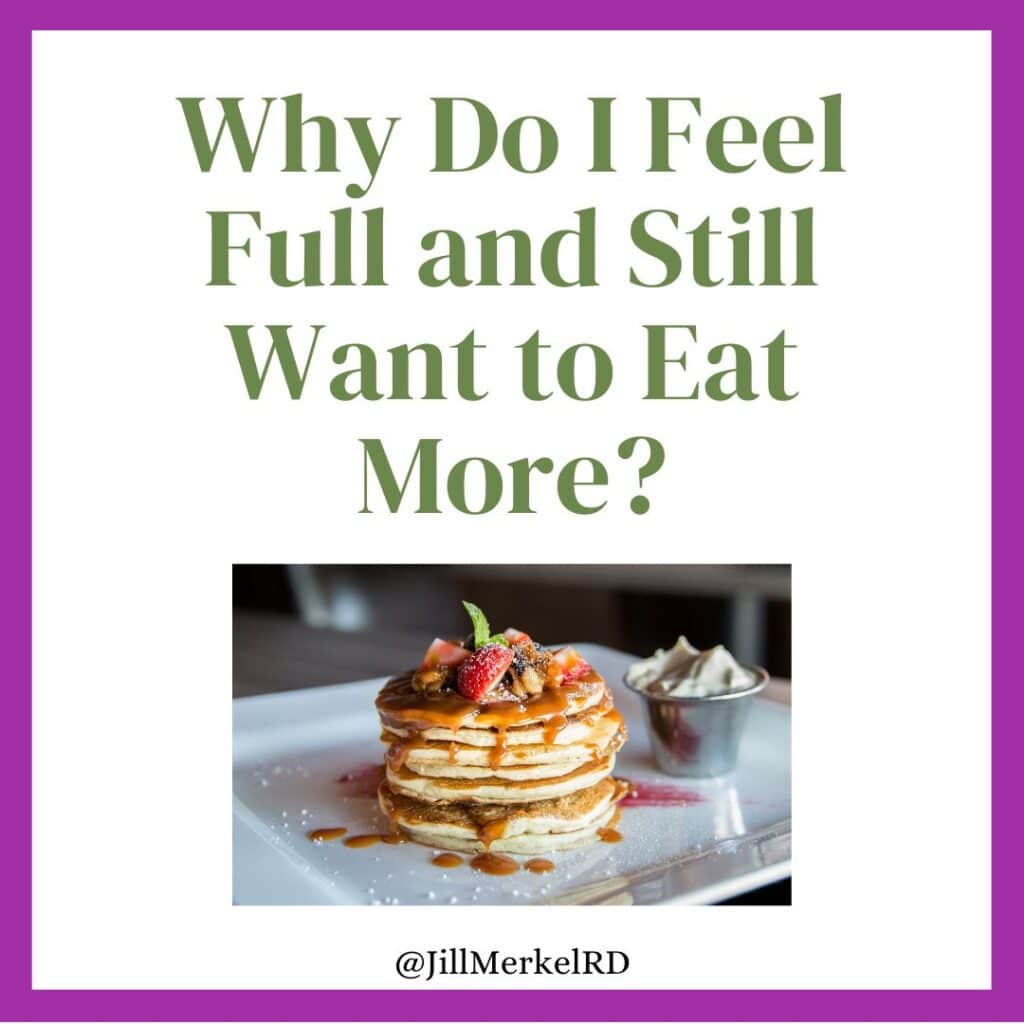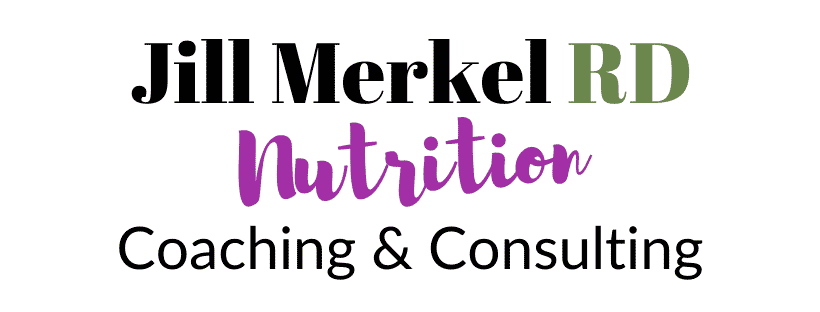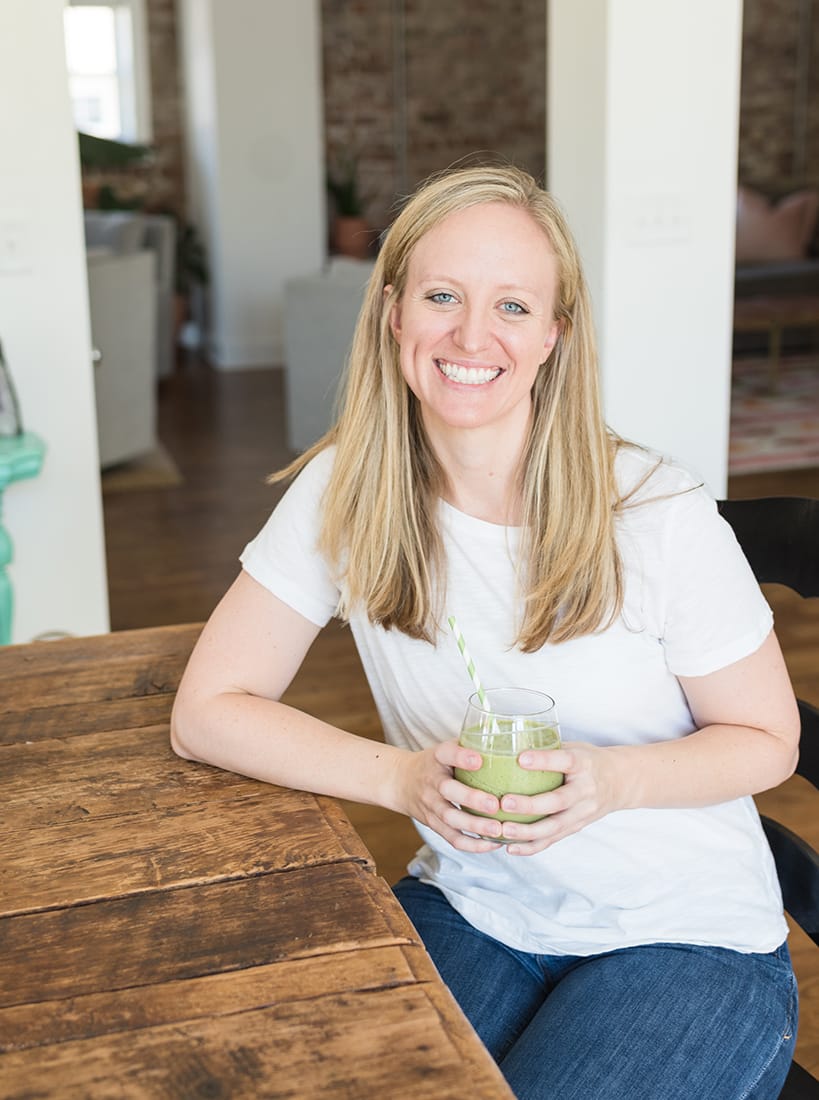Have you ever wondered, “why do I feel full and still want to eat more?”
Well, you are not alone! In this post, we’re going to take a look at what might be going on in these situations.

Why do I feel full and still want to eat more?
Feeling physically full but still wanting to eat more can happen for a lot of reasons. What, why, and how we eat is rather complex. Some of the more common reasons for feeling full and still wanting to eat more are:
- Restriction (physical or mental)
- History of restriction (or food insecurity)
- You feel full but not satisfied
- We eat for reasons besides physical hunger
- Avoidance
Let’s take a look at each of these in more depth.
Restriction.
Not eating enough, whether overall calories or not eating enough of specific foods or food groups, is a common reason for feeling full and still wanting to eat more. Physical restriction (not eating enough) can be intentional or unintentional.
Intentional food restriction often results from dieting, trying to lose weight, disordered eating behaviors, and/or eating disorders. Unintentional food restriction is when you don’t realize you aren’t eating enough or don’t have the means or access to meet your energy needs.
Both of these scenarios may be due to a loss of hunger cues; not responding to your body’s hunger cues or bodily needs; counting or tracking calories, macros, points, etc.; being too busy or distracted to eat; not having access or money for food; exercising; etc.
Restriction is not just physical restriction; it can also be mental restriction. You may be eating enough (or feel you are eating enough) but you’re restricting certain food groups, not allowing all foods or you’re feeling a lot of guilt and shame around food. Telling yourself you’ll “do better tomorrow” or will “never eat this food again” are common thoughts among dieters and can lead to feeling full but still wanting to eat more (your body thinks a future famine is on the horizon!).
Additionally, having a history of restriction or food insecurity can cause you to want to eat more, even when full. The body remembers what it was like to not have enough, and has a hard time trusting that it will continue to get enough. So when it has access to food, it may want to eat more than feels physically necessary or comfortable. It’s your body’s way of protecting itself from a potential future famine (real or perceived).
You feel full but not satisfied.
Another reason you may feel full and still want to eat more is because there’s a difference between fullness and satisfaction. If you have a history of dieting, disordered eating, or an eating disorder, you may not be used to thinking about what foods you like, what foods taste good, and what foods leave you feeling satisfied.
For example, if you’ve ever had a craving for a food, let’s say a brownie, but you were on a diet and thought brownies were “bad” so you ate another food, let’s say an apple, instead. I’ll bet you did not feel satisfied because you did not eat what you wanted to eat. This is an example of feeling full (maybe) but not feeling satisfied.
Feeling full is a physical sensation. Feeling satisfied is a mental or psychological sensation. Both are important to the eating process!
Another way to think about fullness and satisfaction is by the food groups. The four food groups are carbs, protein, fat, and vegetables. In general (so not always), protein and vegetables are physically filling but they are not necessarily satisfying on their own. Whereas carbs and fat tend to be more satisfying.
For example, let’s say you have a grilled chicken breast (protein) and broccoli (vegetable). You may feel full but not satisfied. Versus if you had the chicken breast, broccoli, plus a baked potato (carb) with butter (fat). This meal may feel more filling and satisfying! Yay!
Another way to tell if you are satisfied is that often, when satisfied, you are able to stop thinking about food for a while. After eating a satisfying meal or snack, you might not think about food again until you begin to feel hungry next.
We eat for reasons besides physical hunger.
There are also reasons besides physical hunger that we eat food. Yes, we eat because the body needs food for energy, but we also eat because food tastes good, because we’re celebrating with loved ones, because we are feeling certain emotions, because we’re using food as a coping tool, etc.
Eating for reasons other than physical hunger is not a bad thing! It is often demonized in our society due to diet culture but it shouldn’t be. Food is meant to be enjoyable and pleasurable. Wanting to eat even though you are not physically hungry is normal, common, and valid.
If you find yourself feeling full but wanting to eat more, check in with what else might be going on. Are you tired, sad, stressed, bored, etc.? If you are able to identify how you’re feeling or why you might be turning to food even though you are not physically hungry, that is a good first step!
Remember, you can always choose the food, but you may begin to explore other coping tools that more directly address what you are feeling in that moment. This may be taking a nap or going to sleep if you are tired; calling a friend or watching a funny dog video online if you are sad; going for a walk or run if you are stressed; or calling a friend or reading a good book if you are bored.
You don’t want to stop eating because you’re avoiding something.
Feeling full but still wanting to eat more may be a means of distraction. Perhaps you are using food to avoid doing something else such as dealing with your feelings, doing work, finishing household chores, having a difficult conversation, etc. Food is an easy distractor and a way to avoid doing other, more challenging, things.
Food can also be an “acceptable” reason for relaxing. Hustle culture teaches us we need to constantly be busy and productive, making it hard to allow ourselves to relax and just be. Eating may be a way that you relax because it can feel like you are doing something. Eating may also be a way you unwind or claim some much-needed alone time after a long day.
Again, if you’re able to notice when this is happening and able to check in with yourself and what else might be going on, that can help you to begin to think about if you want to continue eating or if you want to deal with whatever else is going on in another way. The choice is yours and you won’t always get it right, and that’s okay!
Conclusion.
So there you have it! If you ever wondered, “why do I feel full and still want to eat more?” you are not alone!
And as you can see, there is no one answer as to why you may feel full but want to continue eating. Everyone is different and every day is different! It’s important to get curious and to check in with yourself. Once you are able to notice that you’re eating even when you feel full, you can begin to explore why that might be and what else you might do in that moment, if you were to choose to do something other than eat.
You may want to think of it as an experiment. For example, imagine you are feeling bored and looking in the kitchen for something to eat. You might pause and realize you are searching for food out of boredom and not physical hunger. You might experiment with doing something else to occupy your mind and time. Or you might experiment with eating a food and then seeing how you feel. There’s no right or wrong. Make a decision and see what happens. You can always choose differently the next time, if desired.
Looking for More?
Download my FREE Guide – 5 Steps to Stop Obsessing About Food and Your Body
Individual Nutrition Coaching – if you’re looking for more individualized support, check out my options for working together one on one.
Intuitive Eating online course – a self-paced online course that walks you through each of the 10 principles of Intuitive Eating to help you make peace with food once and for all.

